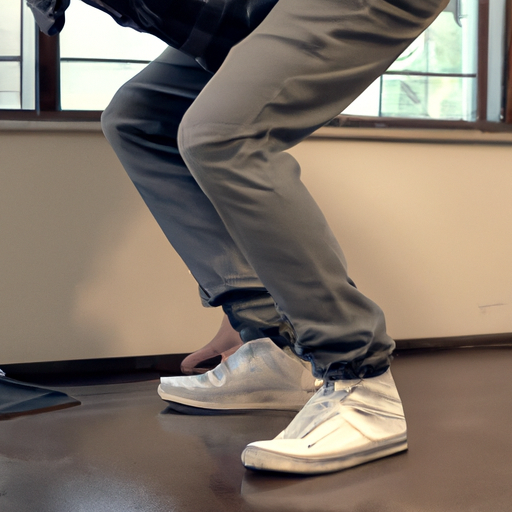
Why do my knees crack when I squat?
-
Contents
Table of Contents
Knees cracking when squatting is a common phenomenon that many people experience. It can be a source of concern for some, as it can be accompanied by pain or discomfort. This article will explore the causes of knee cracking when squatting, as well as potential treatments and prevention strategies. We will also discuss the potential risks associated with this condition and how to best manage it.
The Science Behind Why Your Knees Crack When You Squat
The cracking sound that is heard when one squats is a phenomenon that has been studied by scientists for many years. It is commonly referred to as “crepitus” and is caused by the release of gas bubbles in the joint fluid of the knee.
When a person squats, the pressure in the joint increases, causing the gas bubbles to expand and eventually burst. This creates a popping sound that is commonly referred to as “cracking”. The sound is not caused by any damage to the joint, but rather is a normal part of the joint’s function.
The joint fluid in the knee is made up of a combination of water, proteins, and other substances. When the joint is compressed, the proteins in the fluid form a gel-like substance that helps to lubricate the joint. This gel-like substance is known as synovial fluid.
The synovial fluid contains small amounts of nitrogen, oxygen, and carbon dioxide. When the joint is compressed, the pressure in the joint increases and the gas bubbles expand. As the pressure continues to increase, the gas bubbles eventually burst, releasing a popping sound.
The cracking sound that is heard when one squats is a normal part of the joint’s function and is not a cause for concern. However, if the cracking sound is accompanied by pain or swelling, it is important to seek medical attention as this could be a sign of an underlying medical condition.
How to Reduce Knee Cracking When Squatting
Squatting is an important exercise for strengthening the muscles in the legs and hips. However, some people experience cracking or popping in their knees when they squat. This can be uncomfortable and even painful. Fortunately, there are several steps you can take to reduce knee cracking when squatting.
First, make sure you are using proper form when squatting. Your feet should be shoulder-width apart and your toes should be pointing slightly outward. Your back should be straight and your chest should be lifted. Make sure your knees are tracking in line with your toes and not caving inward.
Second, warm up your muscles before squatting. This will help to loosen the muscles and joints in your legs and hips, making it easier to move into the squat position. A few minutes of light jogging or jumping jacks can help to warm up the muscles.
Third, use a foam roller to massage the muscles in your legs and hips. This will help to loosen tight muscles and reduce tension in the joints.
Finally, use a resistance band to help you maintain proper form while squatting. Place the band around your thighs and focus on pushing your knees outward against the band as you squat. This will help to keep your knees tracking in line with your toes and reduce knee cracking.
By following these steps, you can reduce knee cracking when squatting and make your workouts more comfortable and effective.
The Benefits of Squatting and How to Avoid Knee Cracking
Squatting is a fundamental movement pattern that is essential for everyday life. It is a full-body exercise that works the muscles of the legs, core, and back, and can help improve balance, coordination, and mobility. Squatting can also help to strengthen the muscles of the lower body, which can help to reduce the risk of injury. Additionally, squatting can help to improve posture and reduce back pain.
However, when squatting, it is important to ensure that the knees are not over-extended, as this can lead to knee cracking. To avoid knee cracking when squatting, it is important to ensure that the knees are not pushed beyond the toes. Additionally, it is important to keep the feet flat on the ground and the weight evenly distributed between both feet. It is also important to keep the chest up and the back straight, as this will help to ensure that the knees are not over-extended.
Finally, it is important to ensure that the squat is performed with proper form. This means that the hips should be pushed back and the knees should be kept in line with the toes. Additionally, it is important to ensure that the squat is performed slowly and with control. This will help to ensure that the knees are not over-extended and that the squat is performed with proper form.
In conclusion, squatting is an essential movement pattern that can help to improve balance, coordination, and mobility. Additionally, it can help to strengthen the muscles of the lower body and reduce the risk of injury. However, it is important to ensure that the knees are not over-extended when squatting, as this can lead to knee cracking. To avoid knee cracking, it is important to ensure that the knees are not pushed beyond the toes, the feet are kept flat on the ground, and the weight is evenly distributed between both feet. Additionally, it is important to ensure that the squat is performed with proper form, by pushing the hips back and keeping the knees in line with the toes.
Common Causes of Knee Cracking When Squatting
Squatting is a common exercise that can help to strengthen the muscles around the knee joint. However, some people may experience a cracking or popping sound in their knee when they squat. This is usually caused by a number of different factors.
The most common cause of knee cracking when squatting is a phenomenon known as crepitus. This occurs when air bubbles form in the joint and are released when the joint is moved. This can cause a popping or cracking sound. Crepitus is usually harmless and does not indicate any underlying medical condition.
Another common cause of knee cracking when squatting is a condition known as chondromalacia patella. This occurs when the cartilage on the underside of the kneecap becomes worn down, causing the kneecap to rub against the thigh bone. This can cause a grinding or cracking sound when the knee is moved.
In some cases, knee cracking when squatting can be caused by a tear in the meniscus, which is the cartilage that cushions the knee joint. This can cause a popping sound when the knee is moved.
Finally, knee cracking when squatting can also be caused by a condition known as patellar tendonitis. This occurs when the tendon that connects the kneecap to the shin bone becomes inflamed. This can cause a snapping or popping sound when the knee is moved.
If you experience knee cracking when squatting, it is important to speak to your doctor to determine the cause. Depending on the underlying cause, your doctor may recommend physical therapy, medications, or other treatments to help reduce the symptoms.
How to Strengthen Your Knees to Avoid Knee Cracking When Squatting
Squatting is an important exercise for strengthening the muscles around the knee joint, but if done incorrectly, it can cause knee cracking and pain. To avoid this, it is important to strengthen the muscles around the knee joint and ensure proper form when squatting.
1. Strengthen the Quadriceps: The quadriceps are the muscles located on the front of the thigh. Strengthening these muscles can help to support the knee joint and reduce the risk of knee cracking when squatting. To strengthen the quadriceps, try exercises such as squats, lunges, and leg presses.
2. Strengthen the Hamstrings: The hamstrings are the muscles located on the back of the thigh. Strengthening these muscles can help to support the knee joint and reduce the risk of knee cracking when squatting. To strengthen the hamstrings, try exercises such as leg curls, glute bridges, and hip thrusts.
3. Strengthen the Glutes: The glutes are the muscles located on the buttocks. Strengthening these muscles can help to support the knee joint and reduce the risk of knee cracking when squatting. To strengthen the glutes, try exercises such as squats, lunges, and hip thrusts.
4. Improve Flexibility: Improving flexibility in the muscles around the knee joint can help to reduce the risk of knee cracking when squatting. To improve flexibility, try stretching exercises such as calf stretches, hamstring stretches, and quadriceps stretches.
5. Maintain Proper Form: Maintaining proper form when squatting is essential for avoiding knee cracking. When squatting, keep your feet shoulder-width apart, your back straight, and your knees in line with your toes.
By following these steps, you can help to strengthen the muscles around the knee joint and reduce the risk of knee cracking when squatting. However, if you experience any pain or discomfort when squatting, it is important to stop and seek medical advice.
Q&A
1. What causes my knees to crack when I squat?
The cracking sound you hear when you squat is likely caused by a phenomenon known as crepitus. This is the result of gas bubbles forming and then bursting in the joint space of the knee. This is a normal occurrence and is not usually a cause for concern.
2. Is it bad for my knees to crack when I squat?
No, the cracking sound is not usually a cause for concern. However, if you experience pain or discomfort when squatting, it is best to consult a doctor or physical therapist to determine the cause.
3. How can I prevent my knees from cracking when I squat?
To reduce the likelihood of your knees cracking when you squat, make sure to warm up your muscles and joints before exercising. Additionally, use proper form when squatting and avoid going too deep into the squat.
4. Is there anything I can do to reduce the noise of my knees cracking when I squat?
No, the noise of your knees cracking when you squat is normal and cannot be prevented.
5. Are there any exercises I can do to strengthen my knees?
Yes, there are several exercises you can do to strengthen your knees. These include squats, lunges, step-ups, and leg extensions. It is important to consult a doctor or physical therapist before beginning any exercise program.The cracking sound that is heard when you squat is likely due to the release of gas bubbles in the synovial fluid that lubricates the knee joint. This is a normal phenomenon and is not indicative of any underlying medical condition. Therefore, it is safe to continue squatting without worrying about any potential damage to the knee joint.

